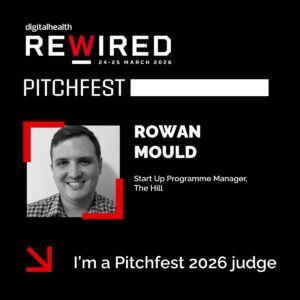We’re excited to announce that Rowan Mould, our Start Up Programme Manager is on the judging panel for Digital Health Rewired Pitchfest 2026.
We caught up with Rowan to find out more.
What is TheHill and what interested you in becoming a Pitchfest judge?
TheHill is Oxford University Hospitals Innovation Service. We work with clinicians and founders to accelerate the adoption of innovative digital solutions across the NHS. We’ve seen a number of companies come through our pathways from Pitchfest over the last few years and I couldn’t pass up the opportunity to get involved to support these companies at the earlier stage.
From your position at TheHill, what do you see as the benefits for a start-up applying to Pitchfest?
Pitchfest gives start-ups the opportunity to take to the stage and pitch their solution directly to influential leaders in digital health and broad breath of NHS staff. For us, Pitchfest is always a strong signal of future potential and helps us identify impactful tech early on. If you’re building great tech with an eye on the NHS, Pitchfest gives you the chance to present to key decision makers that you wouldn’t necessarily get access to easily outside of something like Pitchfest. Additionally, we’re offering a 50% discount to Pitchfest finalists for our procurement workshop – a great opportunity to get a behind-the-scenes overview of procurement in the context of a large, innovative NHS trust.
As a judge, what are the first things you look for in a Pitchfest application? What makes one stand out immediately?
There are three key things I look for: a clearly identified need or problem, evidence and traction, and the potential for meaningful impact. We don’t expect early-stage companies to have everything perfected but demonstrating that you genuinely understand the problem you’re solving, and why it matters immediately helps a solution stand out. Signals of evidence and early traction also make a big difference. Working in an NHS trust, impact is always front-of-mind. I’ll be asking: How does this solution address a real pain point on the frontline? What difference could it make for the doctors, nurses and AHPs caring for patients every day? Solutions that clearly speak to a recognised need, and show how they will improve day-to-day care, always resonate most strongly.
For early-stage companies, how important is evidence of real-world impact compared to a strong idea with potential?
We don’t expect early-stage companies to have all the answers when it comes to evidence, but it’s important to understand that great ideas die without evidence of their real-world impact. If you’re building in healthcare, you should have an eye on the evidence you need to make a compelling business case in the future and make sure that as you’re building, moving towards regulatory approvals, and securing initial pilots, you make sure you’re collecting the right evidence to support this.
You work closely with founders at TheHill. What common mistakes do you see start-ups make in pitches, and how can they avoid them when applying to Pitchfest?
One of the biggest mistakes I see founders’ make in pitches is to place too much emphasis on the technical aspects of the solution and not enough on the potential impact, problem they are solving and traction thus far. We need to know how your solution works but showing how you understand how your solution could impact on your users helps us see that you understand your users and the problem that you’re trying to solve.
What’s the key quality a start-up should have to collaborate with the NHS?
There are two key qualities that help start-ups work more effectively with the NHS: resilience and being open to feedback. Working with the NHS is a long-term play and you need to be able to take that longer-term view on your growth journey. Additionally, clinicians are generally happy to give feedback on new tech; it’s about taking that feedback and embedding it into your product design to ensure you’re closely aligned to the real-world needs on the frontline.
Where do you think the biggest opportunities for start-up-led innovation lie within the NHS over the next decade?
As the NHS 10-year plan moves from strategy to implementation, we’re expecting that there will be a lot more momentum behind innovation across the NHS. It’s an ideal time to be building in healthcare – there are increasing opportunities in specialised AI solutions for specific use-cases, rather than the more general AI solutions that are coming out. Additionally, solutions that can deliver efficiencies and improved productivity will be key over the next few years.
Finally, what single piece of advice would you give to any founder thinking about applying to Pitchfest this year?
Get your application in! It’s a fantastic opportunity to get your solution in front of the right people. Make sure you clearly show how your innovation will deliver impact and the evidence behind the work you’ve done so far.
Previous Pitchfest winners including Goggleminds and Cardmedic are great examples of what can follow. We supported them early in their journeys, and they’ve gone on to achieve incredible things. Your start-up could be next.
Find out more about Pitchfest and apply to pitch via the Digital Health Rewired website.
Digital Health Rewired runs from 24-25 March 2026 at the NEC in Birmingham. Visit the Digital Health Rewired website to register.
